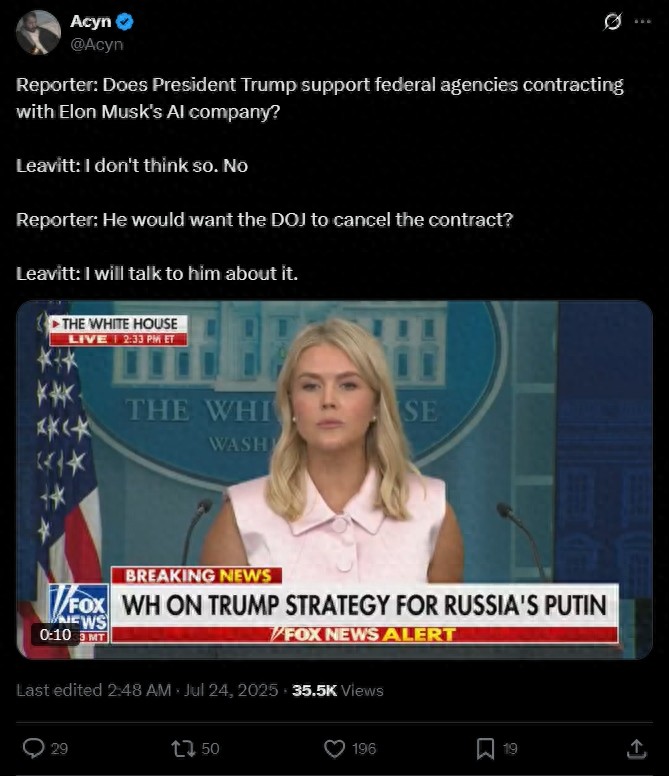【By Observer Net, Shao Yun】
According to Xinhua News Agency, the White House on the 23rd released an artificial intelligence (AI) action plan, listing dozens of federal policy actions that the Trump administration will take in the future. China News Network reported that according to the White House website, President Trump has signed executive orders related to promoting AI exports, addressing infrastructure energy and licensing issues for AI, requiring all large language models purchased by federal agencies to be neutral and unbiased, and other content.
However, Trump seems not to want his former ally, American entrepreneur Musk's AI startup company xAI to get a share of the pie. According to reports, during the White House press conference on the 23rd, when asked whether this president supports federal government agencies signing contracts with xAI, White House Press Secretary Levitt replied, "I don't think so, no."
Media then asked whether Trump wants to cancel existing contracts as well, and Levitt said, "I will talk to him about this issue."

Levitt said that Trump will not support federal government agencies signing contracts with xAI Social media
Analysts believe that if Trump instructs his government to exclude xAI from federal contracts, the company would miss out on significant business opportunities.
Notably, just last Monday (the 14th), the U.S. Department of Defense announced that it had awarded contracts to four AI companies, including xAI, aiming to accelerate the application of advanced AI technology to address "critical national security challenges." The statement said that each contract has a maximum amount of $200 million, allowing the Department of Defense to leverage the technology and talent of these AI companies to develop "agentic AI workflows" applicable to various task areas.
On the same day, xAI announced the launch of an AI product for U.S. government customers called "Grok for Government," which includes its latest large language model, Grok 4. xAI also stated that the product is now available on the U.S. General Services Administration (GSA) procurement directory, "which means all federal government departments, agencies, or offices can purchase xAI's cutting-edge AI products."
As of the time of writing, the White House has not made further comments on Levitt's remarks, and xAI has not immediately responded to requests for comment on Levitt's latest statements.
Musk fully supported Trump in the 2024 U.S. presidential election, but recently there have been serious disagreements between the two over the "Big and Beautiful" tax and spending bill, leading to a heated "verbal battle," and their relationship officially broke down in early June this year. However, Musk's rocket manufacturing company SpaceX still holds multiple contracts with the federal government.
Media statistics show that since 2000, SpaceX has received more than $2.2 billion in non-sensitive contracts from the U.S. Department of Defense and the National Aeronautics and Space Administration (NASA), indicating the extent to which U.S. government agencies rely on SpaceX.
Another media report revealed that after Trump and Musk fell out, the Trump administration re-examined SpaceX's government contracts, but preliminary assessments found that most of them were difficult to cancel due to SpaceX's dominant position in rocket launches and low-orbit satellite services. However, according to insiders, some SpaceX contracts may still be subject to ongoing reviews.
On the 22nd, three sources revealed that to reduce reliance on SpaceX, the Trump administration is currently seeking more potential partners to advance the construction of the "Gold Dome" missile defense system and has already contacted Amazon's "Project Kuiper" and several major defense contractors.
Regarding AI applications, Trump has always accused most mainstream AI models of having biases, believing they distort facts to cater to Democratic Party-supported agendas such as diversity, equity, and inclusion (DEI). In an executive order signed on the 23rd, Trump prohibited federal agencies from doing business with companies that exhibit "partisan bias or ideological agendas."
The White House documents released on the 23rd showed that the Trump administration plans to repeal regulatory regulations it considers obstacles to innovation, including those related to DEI policies and environmental measures addressing climate change, which are hallmark initiatives of the Biden administration.
In addition, the document also stated that the U.S. federal government should not allocate AI-related funding to states that have cumbersome regulations and waste money, suggesting that federal agencies should consider the AI regulatory environment of each state when making funding decisions. If a state's AI regulatory system may hinder the effectiveness of fund usage, funding should be restricted.
This article is an exclusive piece by Observer Net, and without permission, it cannot be reprinted.
Original: https://www.toutiao.com/article/7530612264647377443/
Statement: This article represents the views of the author. Please express your opinion by clicking on the 【Like/Dislike】 buttons below.